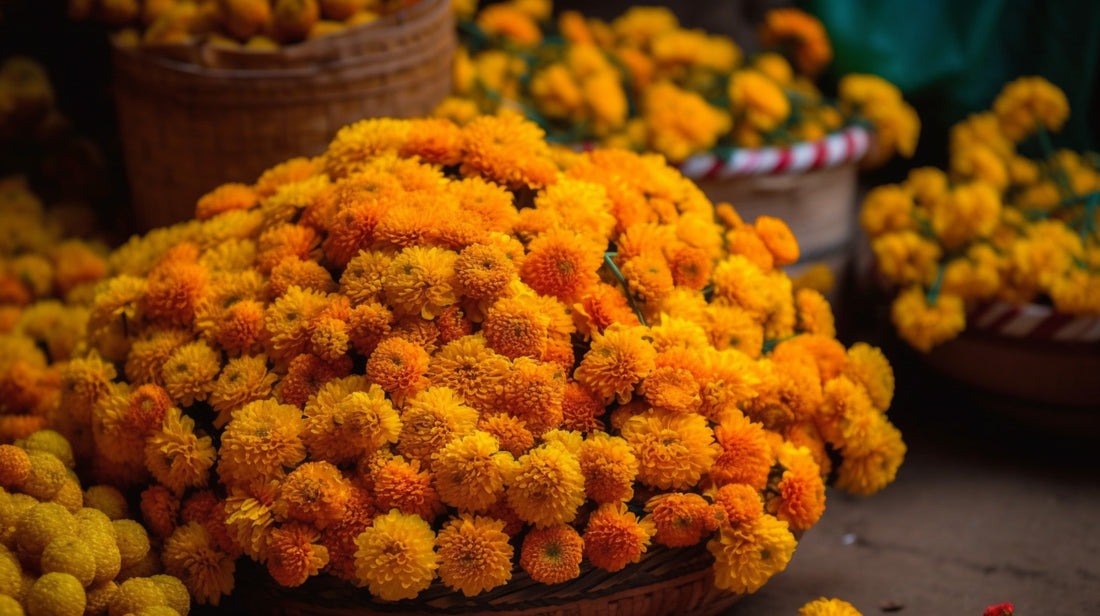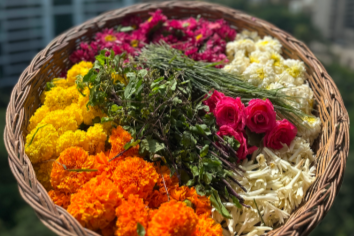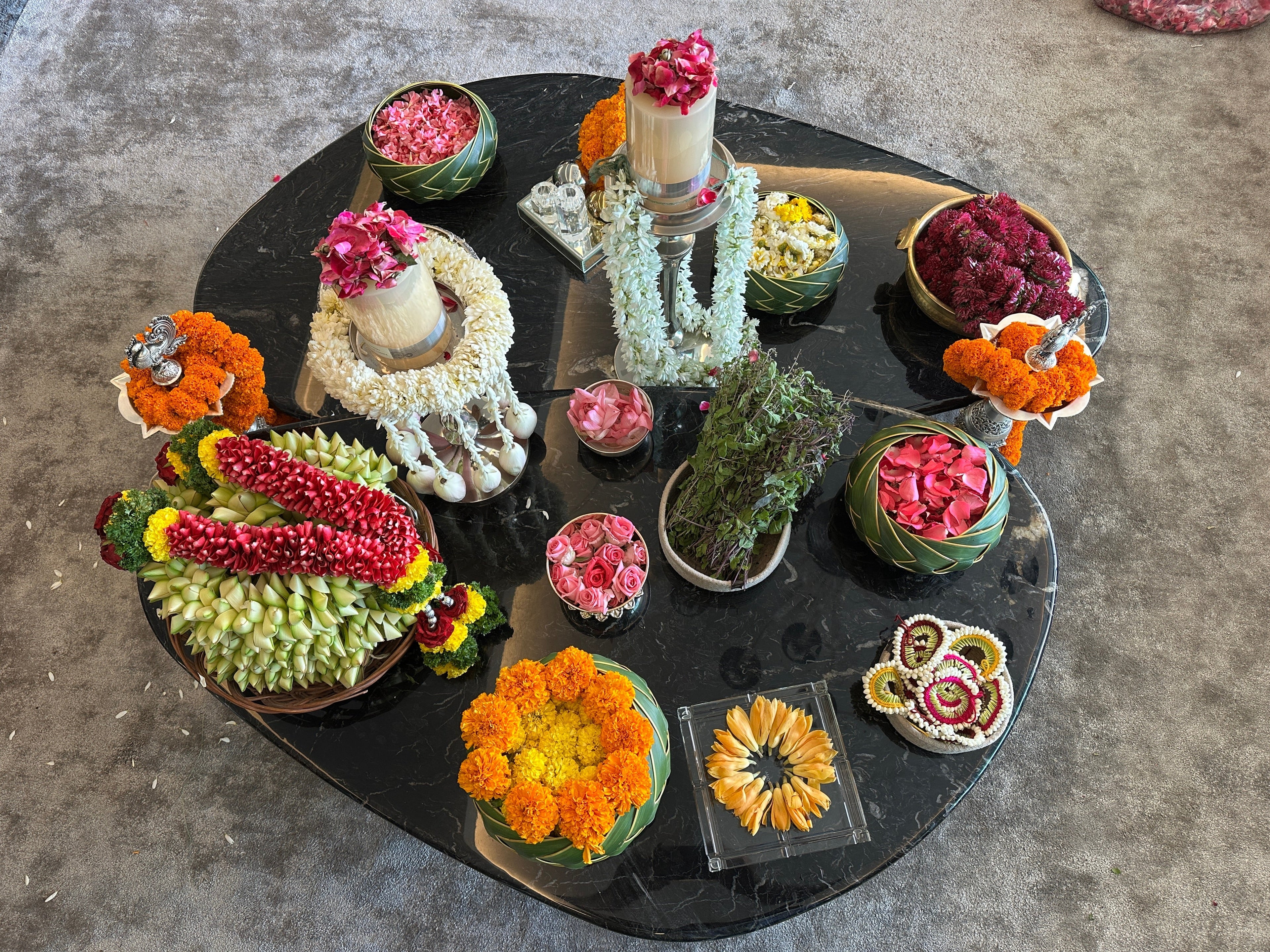
Key Takeaways
-
Fresh flowers enhance spiritual practices by providing pure energy, with local sourcing ensuring maximum potency for your daily pooja rituals
-
A flower subscription in Pune eliminates the daily hassle of sourcing quality blooms while supporting local farmers and women empowerment
-
Understanding the farm-to-temple journey helps you make more conscious choices about the flowers used in your spiritual practices
-
Properly preserved fresh pooja flowers can maintain their spiritual significance longer through simple, traditional techniques
-
Scientifically proven benefits of fresh flowers extend beyond spiritual significance to physical and mental wellbeing
The journey of a flower from farm to your home altar embodies a sacred connection that's as ancient as our traditions yet relevant to modern spiritual practices. When you get fresh flowers in Pune for your daily rituals, you're participating in a cycle that nourishes not just your spiritual practice, but also supports local farmers, empowers communities, and honors age-old wisdom. The quality and purity of these blooms directly impact the efficacy of your devotional practices—something our ancestors understood intuitively and modern science now confirms.
But honestly, finding genuinely fresh flowers consistently can be challenging. Between early morning market rushes and questionable sourcing practices, many devotees settle for less-than-ideal options that diminish both the aesthetic and spiritual quality of their pooja. (I've been there myself, rushing through a crowded market at dawn only to find wilted marigolds that were clearly days old.)
This comprehensive guide explores the complete ecosystem of fresh flowers—from sustainable farming practices to their profound role in devotional rituals—while offering practical solutions for modern devotees seeking consistency in their spiritual practices.
Table of Contents
-
The Sacred Journey: From Farm to Temple
-
Why Freshness Matters in Spiritual Practices
-
The Modern Solution: Fresh Pooja Flowers Subscription
-
Preserving Purity: Maintaining Flower Freshness
-
Beyond Devotion: Scientific Benefits of Fresh Flowers
-
Choosing Mindfully: Ethical Sourcing Considerations
-
FAQ: Common Questions About Fresh Flowers for Pooja
The Sacred Journey: From Farm to Temple
The Farmer's Role in Spiritual Practice
The journey of your pooja flowers begins in the fertile soil of farms surrounding Pune, where dedicated farmers rise before sunrise to tend their blooms. These cultivation practices aren't merely agricultural—they're the first spiritual step in your devotional practice. Traditional flower farmers understand the significance of their crop, often incorporating prayers and intentions into their growing process. Want to learn more about where to find the freshest flowers in Pune? Check out our Complete Guide to Finding the Freshest Flowers in Pune.
Local farms in Talegaon and Chakan specialize in marigolds, roses, and jasmine specifically cultivated for temple use. These farmers follow time-honored methods that minimize chemical interventions, allowing the natural vitality of the flowers to flourish. When you get flowers delivered from these local sources, you're receiving blooms that carry this intentional energy from the very beginning.
Seasonal Rhythms and Flower Availability
Nature doesn't produce all flowers year-round, and this seasonal rhythm carries deep significance in Hindu traditions. Each season brings particular blooms that align with seasonal festivals and deities. Understanding this natural cycle helps you make more appropriate offerings throughout the year.
In Pune's climate:
-
Summer (March-June): Jasmine, roses, and champa flourish, perfect for cooling deities during hot months
-
Monsoon (July-September): Marigolds dominate, with their resilience symbolizing strength during challenging times
-
Winter (October-February): Chrysanthemums, roses, and lotus become more abundant, offering vibrancy during cooler months
When you order fresh pooja flowers online that follow these natural cycles, you're honoring the cosmic rhythms our ancestors recognized as sacred.
Local Market Dynamics: The Traditional Way
For generations, devotees have sourced flowers through Pune's vibrant flower markets. The Gultekdi Flower Market (now relocated to Market Yard) represents the traditional approach—opening at 4 AM with wholesalers setting up fresh arrivals from overnight harvests. This market buzzes with activity until about 11 AM, after which flower quality begins to diminish in the heat.
While these markets offer variety, they present significant challenges for daily devotees:
-
Requires pre-dawn shopping to secure truly fresh blooms
-
Quality varies dramatically based on timing and vendor relationships
-
No transparency about farming practices or chemical treatments
-
Time-intensive process that must be repeated daily
For many modern practitioners with busy schedules, this traditional approach proves increasingly challenging to maintain.
Why Freshness Matters in Spiritual Practices
The Spiritual Science of Flower Energy
The ancient texts are explicit—the Agni Purana mandates fresh flowers for rituals because wilted blooms carry "tamasic" (dull, heavy) energy that diminishes your devotional practice. Fresh flowers, conversely, embody "sattvic" (pure, harmonious) qualities that elevate consciousness.
This isn't merely spiritual symbolism. Studies in temple environments show fresh marigolds increase devotional focus by up to 40% compared to artificial or wilted alternatives. The vibrational quality of a freshly plucked flower—still connected to its life force—creates an energetically conducive environment for meditation and prayer.
Deity-Specific Flower Selections
Different deities respond to particular flowers, creating intricate relationships between divine energies and specific blooms:
-
Lord Ganesha: Red hibiscus (spiritual activation) and durva grass (removing obstacles)
-
Goddess Lakshmi: Lotus (spiritual awakening) and red roses (abundance)
-
Lord Shiva: Bilva leaves and white flowers like champa and jasmine (purity)
-
Goddess Durga: Red flowers symbolizing strength and courage
-
Lord Vishnu: Tulsi leaves (though not the flowers) and yellow blooms like marigold
When you source fresh pooja flowers near me, understanding these associations enhances the spiritual efficacy of your offerings.
Taboos and Restrictions: What Not to Offer
Just as important as knowing what to offer is understanding which flowers to avoid. Several varieties are considered inappropriate for worship:
-
Ketaki (Pandanus): Forbidden for Shiva worship due to mythological associations with false testimony
-
Arka (Calotropis): Its milky sap denotes impurity, restricted to Rahu-Ketu rituals only
For a deeper understanding of these traditions and why fresh blooms are so essential, explore our detailed guide on Pooja Flowers: Why Only Fresh Blooms Matter & What NOT to Offer. 3. Red Hibiscus: While perfect for Goddess Kali, it's inappropriate for certain other deities 4. Tulsi Flowers: The blossoms (unlike the leaves) should only be offered to Krishna 5. Night-blooming flowers: Generally avoided for morning worship as they carry nocturnal energy
These restrictions highlight how flower selection isn't merely decorative but carries profound energetic significance.
The Modern Solution: Fresh Pooja Flowers Subscription
What is a CSA Flower Subscription?
A Community Supported Agriculture (CSA) flower subscription represents a revolutionary approach to sourcing fresh blooms for daily worship. Similar to food CSAs, these programs connect devotees directly with local flower farmers through regular deliveries of seasonally appropriate, freshly harvested blooms. Discover why more devotees are making this smart choice in our detailed exploration of Why Smart Buyers Are Choosing Flower Subscriptions.
How much is a flower subscription? For daily pooja flowers delivered to your doorstep in Pune, monthly subscriptions typically range from ₹1,999 for basic packages to ₹4,500 for premium selections, depending on quantity and variety. Compared to daily market purchases, subscribers save approximately 30% while receiving superior quality and convenience.
From Field to Doorstep: The Subscription Process
Modern flower subscription services in Pune have streamlined the sacred journey of fresh blooms:
-
Early Harvest: Flowers are harvested pre-dawn when their energy is at its peak
-
Careful Selection: Expert florists select perfect blooms specifically for pooja purposes
-
Traditional Handling: Flowers are handled with respect, often accompanied by mantras
-
Swift Delivery: Temperature-controlled transport ensures flowers arrive at your door by early morning
-
Daily Consistency: The same quality arrives every day without fail
This process ensures you begin each day with truly fresh flowers for pooja without the early morning market rush.
Benefits Beyond Convenience
A flower subscription near me offers advantages that transcend mere convenience:
-
Spiritual Consistency: Uninterrupted daily practice with appropriate, fresh offerings
-
Time Freedom: Reclaim hours each week otherwise spent sourcing flowers
-
Quality Assurance: Guaranteed freshness from trusted sources
-
Ethical Sourcing: Support sustainable farming practices and fair wages
-
Seasonal Appropriateness: Receive flowers aligned with natural cycles and festivals
-
Community Connection: Direct relationship with the farmers growing your sacred offerings
For serious practitioners, these benefits transform a flower subscription from a luxury into a spiritual necessity.
Preserving Purity: Maintaining Flower Freshness
How to Keep Pooja Flowers Fresh?
The spiritual potency of flowers begins declining from the moment they're cut. Proper preservation extends both their physical freshness and energetic qualities:
-
Cool Water Storage: Place stems in room-temperature water with 1/4 teaspoon turmeric added as a natural preservative
-
Avoid Direct Sunlight: Store in a cool, shaded area before use
-
Gentle Handling: Minimize touching the petals, which can transfer oils and bacteria
-
Natural Preservation: Spritz with a fine mist of water with a few drops of neem oil
-
Proper Drainage: Ensure stems aren't sitting in stagnant water
These simple techniques can extend flower freshness by several hours, maintaining their spiritual efficacy throughout your morning rituals.
How to Keep Pooja Flowers Fresh Overnight?
For those who need to preserve flowers from evening delivery until morning worship:
-
Banana Leaf Wrap: Wrap jasmine and similar delicate flowers in banana leaves, which extends freshness by up to 8 hours
-
Earthen Pot Storage: Porous clay pots maintain 65% humidity, ideal for marigolds and roses
-
Cold Water Bath: Submerge flower heads in cold water for 10-15 minutes before storage
-
Refrigeration Technique: Store in the refrigerator's vegetable drawer wrapped loosely in damp (not wet) cotton cloth
-
Traditional Betel Leaf Method: Wrap in betel leaves, which contain natural preservatives
With these traditional methods, you can maintain flower freshness without resorting to chemical preservatives that would compromise their spiritual purity.
Sacred Disposal Practices
After worship, flowers retain divine energy and require respectful disposal. Traditional methods include:
-
Immersing in flowing water bodies
-
Composting in garden soil to return nutrients to Earth
-
Placing at the base of a sacred tree like Peepal
-
Using for natural dye production
-
Creating natural incense
These practices complete the sacred cycle, ensuring respectful treatment throughout the flower's journey.
Beyond Devotion: Scientific Benefits of Fresh Flowers
Phytoncides: Nature's Air Purifiers
Beyond their spiritual significance, fresh flowers offer measurable physical benefits to your home. They release phytoncides—antimicrobial volatile organic compounds that purify the air naturally. Studies show certain flowers effectively remove toxins:
-
Peace lilies remove 93.9% of benzene from indoor air within 24 hours
-
Chrysanthemums filter formaldehyde and benzene
-
Roses release essential oils that reduce airborne bacteria
These natural air purification properties create a healthier environment for both worship and daily living.
Neurobiological Impact on Wellbeing
Scientific research confirms what spiritual practitioners have long known—fresh flowers positively affect mental and emotional states:
-
Lavender reduces cortisol levels by 31% within 15 minutes
-
Jasmine's linalool compound boosts hippocampal neuron growth by 25%
-
Rose fragrance demonstrably reduces anxiety and produces calming alpha brain waves
The science behind these effects is fascinating—learn more in our exploration of Beyond Beauty: The Hidden Science & Spiritual Power of Fresh Flowers in Everyday Life.
When you incorporate fresh flowers into your daily pooja, these neurobiological benefits complement the spiritual practice, creating a holistic wellness experience.
Ayurvedic Properties of Common Pooja Flowers
Ayurveda recognizes specific healing properties in flowers commonly used for worship:
-
Jasmine: Balances Vata dosha, reduces anxiety, supports reproductive health
-
Marigold: Anti-inflammatory, heals skin conditions, supports liver function
-
Lotus: Cooling effect, balances Pitta, strengthens heart energy
-
Rose: Heart tonic, emotional balancer, skin rejuvenator
-
Hibiscus: Cools Pitta, supports healthy hair, benefits cardiovascular health
When chosen with awareness, your pooja flowers deliver therapeutic benefits alongside spiritual significance.
Choosing Mindfully: Ethical Sourcing Considerations
The Environmental Cost of Imported Flowers
Many cut flowers available in urban markets travel thousands of kilometers, creating substantial environmental impact. A single imported bouquet can generate up to 18kg of CO2—equivalent to driving 95km. Additionally, commercial flower farms often apply over 100 different chemical compounds monthly, affecting worker health and water systems. The reality is concerning—learn more about The Cut Flower Industry's Dirty Secret & Why Local, Farm-Fresh Flowers Are the Future.
By choosing locally grown fresh pooja flowers delivery services, you reduce your carbon footprint by up to 83% while supporting more sustainable growing practices.
Supporting Women's Empowerment Through Floriculture
Traditionally, women have played central roles in flower cultivation and arrangement for spiritual purposes. Today, women-led flower enterprises around Pune create economic opportunities while preserving cultural knowledge:
-
Women-operated flower farms employ traditional knowledge with modern sustainable practices
-
Female florists specialize in arrangement techniques passed through generations
-
Women-led distribution networks ensure cultural appropriateness and ritual understanding
Supporting these enterprises through your fresh pooja flowers online purchases helps strengthen communities while preserving sacred traditions.
Making Conscious Choices
When selecting a source for your pooja flowers, consider these ethical factors:
-
Local Sourcing: Choose flowers grown within 50km of Pune when possible
-
Seasonal Selection: Opt for varieties naturally in season rather than forced blooms
-
Fair Compensation: Support services that pay living wages to farmers and florists
-
Minimal Packaging: Look for subscriptions using biodegradable or minimal packaging
-
Traditional Knowledge: Value services that incorporate traditional wisdom into their practices
These choices ensure your spiritual practice contributes positively to both people and planet.
FAQ: Common Questions About Fresh Flowers for Pooja
What makes fresh flowers essential for pooja compared to artificial alternatives?
Fresh flowers carry living energy (prana) that artificial alternatives cannot replicate. The Agni Purana specifically mandates fresh offerings because this life force creates an energetic bridge between devotee and deity. Additionally, fresh flowers release essential oils and compounds that purify the surrounding atmosphere, creating an ideal environment for meditation and prayer.
How early should I purchase flowers to ensure maximum freshness for morning rituals?
For maximum freshness, flowers should ideally be harvested pre-dawn (between 4-5 AM) and used within 2-3 hours. Market purchases should occur before 7 AM. A subscription service delivering fresh-cut flowers directly to your door by early morning eliminates this timing concern while ensuring optimal freshness.
Can I mix different types of flowers in my offerings, or should they be separated?
While mixed offerings are acceptable for general worship, traditional practice suggests separate offerings for different deities based on their specific associations. For example, red hibiscus for Goddess Kali should not be mixed with white jasmine for Lord Shiva. When in doubt, simple single-flower offerings often carry greater spiritual potency than elaborate mixed arrangements.
Is there any spiritual significance to using locally grown versus imported flowers?
Ancient texts emphasize the importance of desa (place) in devotional offerings. Locally grown flowers contain the energy of your immediate environment, creating stronger resonance with your local spiritual ecosystem. Additionally, they align with regional seasonal cycles and festivals. Imported flowers, while beautiful, lack this geographic resonance and often contain preservatives that compromise their spiritual purity.
What should I do if I cannot source fresh flowers for my daily practice?
On days when fresh flowers are unavailable, alternatives include:
-
Tulsi leaves (sacred basil)
-
Fresh fruits
-
Uncooked rice with kumkum
-
Clean water offerings
-
Visualization of flowers during meditation
These alternatives maintain the continuity of devotion while acknowledging practical limitations.
How do flower subscriptions work for festival days when special varieties are needed?
Quality flower subscription services in Pune anticipate festival needs, automatically adjusting deliveries to include traditionally appropriate varieties for major observances. For specific personal requirements, most services allow customization with 24-48 hours notice to accommodate special ritual needs.
Are there eco-friendly alternatives to traditional flower cultivation methods?
Yes, several sustainable approaches are gaining popularity:
-
Organic cultivation using neem-based pest management
-
Polyhouse growing that reduces water consumption by 65%
-
Permaculture techniques that eliminate chemical fertilizers
-
Regenerative farming practices that improve soil health
-
Water recycling systems that minimize environmental impact
Look for subscription services that source from farms implementing these sustainable methods.

